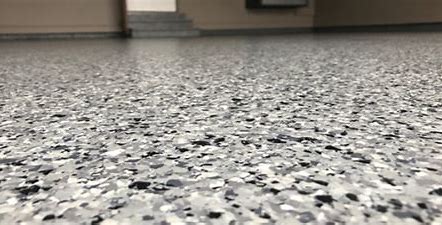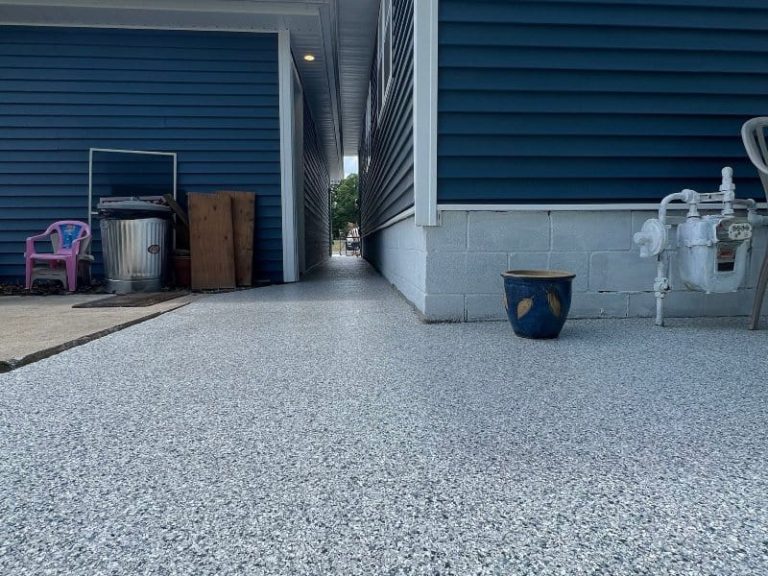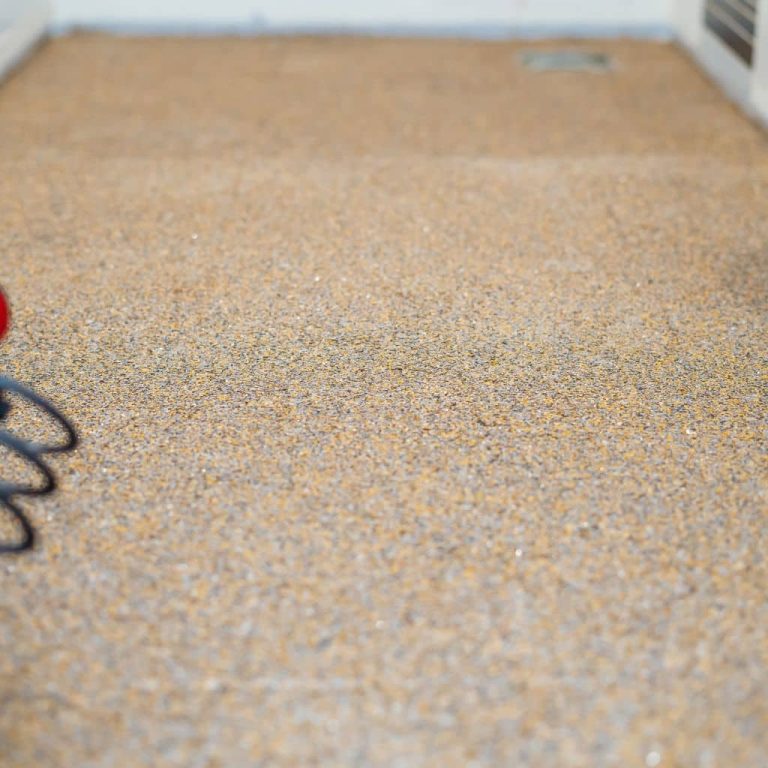If you’re thinking about coating your concrete floor, then you know you need a solution, but you might not be sure what the difference is between polyurea and epoxy.
This short guide will break down the key differences so you can make a more informed decision.
Let’s start with the basics.
What Is Polyurea?
Polyurea is a type of coating made from a chemical reaction between two components—an isocyanate and a resin. When combined, they create a fast-curing, flexible, and durable material that’s used to protect concrete floors.
Polyurea is known for its quick installation, strong adhesion, and durability.
Note: Polyaspartic is a type of polyurea, but not all polyurea is polyaspartic. This is worth noting because the terms are often confused.
What Is Epoxy?
Epoxy is a type of resin-based coating made by mixing a resin (Part A) with a hardener (Part B). Once combined, it forms a rigid, durable surface that bonds to concrete floors.
Epoxy is commonly used for both residential and commercial flooring because it’s cost-effective.
What’s The Main Difference?
The main difference between polyurea and epoxy lies in their chemical structure and how they cure.
Polyurea is an elastomer, making it more flexible and able to move with the concrete, while epoxy is a thermoset plastic, which cures into a harder, more rigid surface.
Which Is Better, Polyurea or Epoxy?
There’s no one-size-fits-all answer. Which coating is better depends on your needs, budget, and application.
Product quality and formulation also vary widely, which makes direct comparisons tricky. For example, in commercial applications, you’re going to see a big difference between a water-based epoxy product and High Solids Epoxy. Likewise, not all polyurea products are made equal.
That said, our view is that polyurea is better for residential, while for commercial applications, epoxy has its place. We understand other professionals may have a different opinion.
Polyurea and Epoxy Compared
Let’s now compare some key factors, again keeping in mind that product quality and installation techniques vary, so these are general rules only.
Durability and Longevity
Polyurea: 15 years before wear and tear start to show.
Epoxy: 3 to 5 years for wear and tear to start showing. However, some epoxy products, with the right installation, can last much longer.
Flexibility
Polyurea: More flexible and better able to bend with your slab.
Epoxy: More rigid, brittle, and prone to breaking.
UV Resistance
Polyurea: It is very UV resistant and does not discolor.
Epoxy: Tends to yellow in the sun, but it’s possible to mitigate this issue. For example, you can cover the floor with chips to protect the floor from UV exposure.
Heat Resistance
Polyurea: Handles temperature ranges from -58°F to a stable 266°F, with temporary resistance reaching as high as 430°F.
Epoxy: Handles temperature ranges between -60°F and 150°F for standard formulations, although specialized formulations are capable of handling up to 600°F temporarily.
Prep, Install, and Cure
Polyurea:
The concrete needs to be properly prepared before applying polyurea. This includes repairing any damage and diamond grinding the surface to create a rough, even profile. Because polyurea sets very quickly, everything must be prepped and ready to go before application starts.
Most polyurea coatings cure fully within 24 hours, allowing for a faster return to service.
Epoxy:
Surface preparation for epoxy varies depending on the installer. Some use acid etching to prepare the surface, while others prefer diamond grinding. Any damage in the concrete needs to be fixed before the coating is applied.
Once installed, epoxy takes longer to cure, typically between 3 to 5 days.
Which Is More Expensive, Polyurea or Epoxy?
As with most things, it depends on the project.
For residential, a polyurea floor will usually cost more than epoxy, upfront at least. If you choose a low-grade epoxy solution, you’ll likely need to repair it at some point, so it could cost you more in the long run.
However, a commercial epoxy system will cost significantly more than a basic residential polyurea floor.
All considered, here’s a general comparison of prices:
Polyurea: $7 to 12 per square foot.
Epoxy: $3 to $12 per square foot.
These prices apply in Northern Indiana, Chicagoland, and Southwest Michigan, but prices vary per region.
Contact Level 10 Coatings
At Level 10 Coatings, we offer polyurea solutions for residential projects and epoxy for commercial spaces. We are a local, family-owned business that puts customers first.
We’d love to hear from you. Contact us today for a custom quote.


